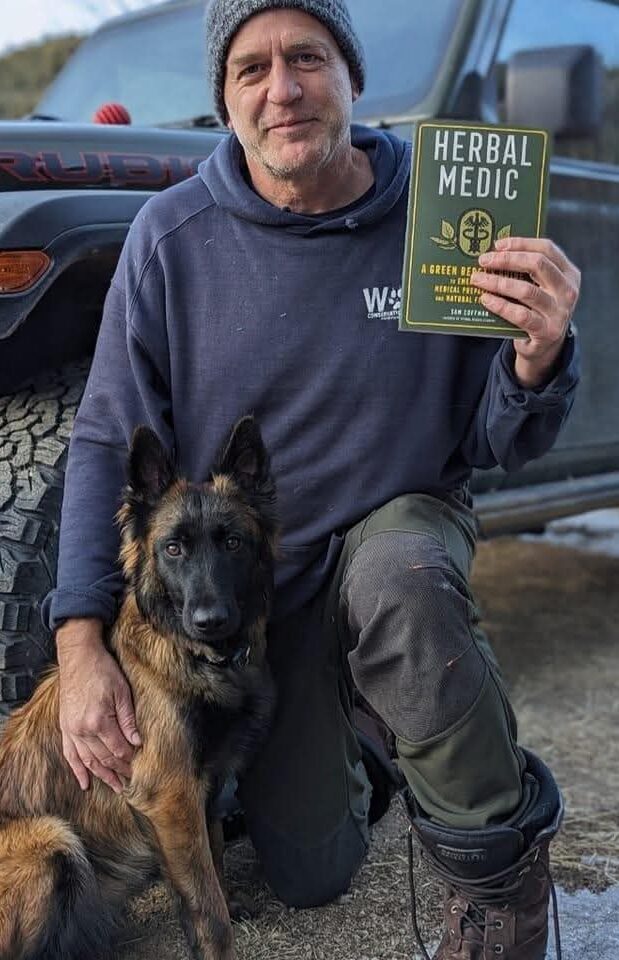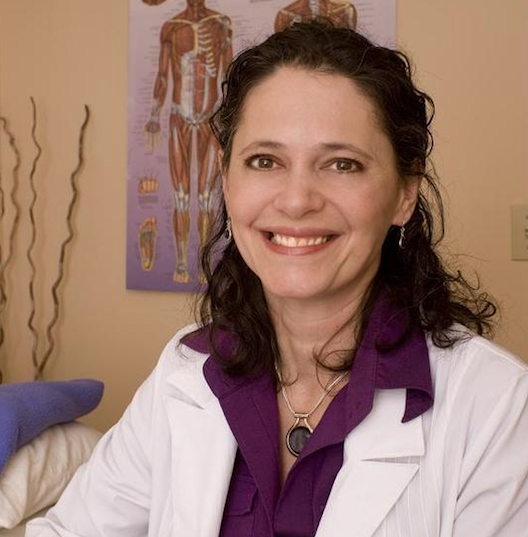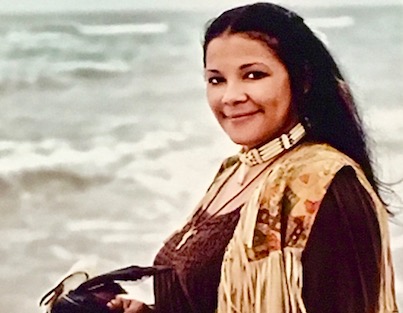Sam Coffman, L. Ac., W-EMT, RH[AHG], began his medical education in the US Army as a Green Beret Medic (18D) in 1989. Over the years that followed, he dedicated himself to being able to work with botanical medicine as a successful method to provide sustainable health care in remote and post-disaster regions for chronic, acute and physical trauma care. Since that time, Sam has taught herbalism for over 30 years and has worked as a clinical herbalist for over 15 years. His herbal and acupuncture clinic/apothecary are now located in Taos, NM along with his school.
In 2007, Sam founded Herbal Medics Academy (AKA The Human Path), which offers five primary herbalism programs – Clinical Herbalism, Austere Medicine, Advanced Medicine Making, Community Herbalism and Family Herbalism. Sam has developed over 1000 hours of curriculum, in addition to other curriculum developed by the 12+ instructors working for his school part-time. As a few of the curriculum highlights of his school, Sam teaches the integration of herbal medicine with both functional medicine and austere medicine together with two medical doctors who also specialize in those areas. At the new Taos campus, Sam teaches many on-site medicine courses to include WFA and WFR certification, CERT certification, wilderness survival, TECC certification and a 12-day Herbal and Off-Grid Medicine Experience (HOME) course together with Dr. Steve Pehrson MD.
Sam and his wife, Suchil, also co-founded Herbal Medics in 2010 which is an outreach organization that gives their students and interns an opportunity to work in the field while providing free health care and education to underserved communities. They have worked in Nicaragua, Mexico and all over the USA both to provide post-disaster relief as well as provide free herbal clinics, education and sustainable medicine/food projects for underserved communities.
Sam currently is the training director for Taos Search and Rescue (TSAR) and is also part of the canine search and rescue team together with his Belgian Tervuren dog, Lucy. His book “Herbal Medic” has been in the top 3 best-selling books for Storey Publishing for the past 2 years. His new book under Storey Publishing is titled “Survival Gardening” and was released in January, 2025.
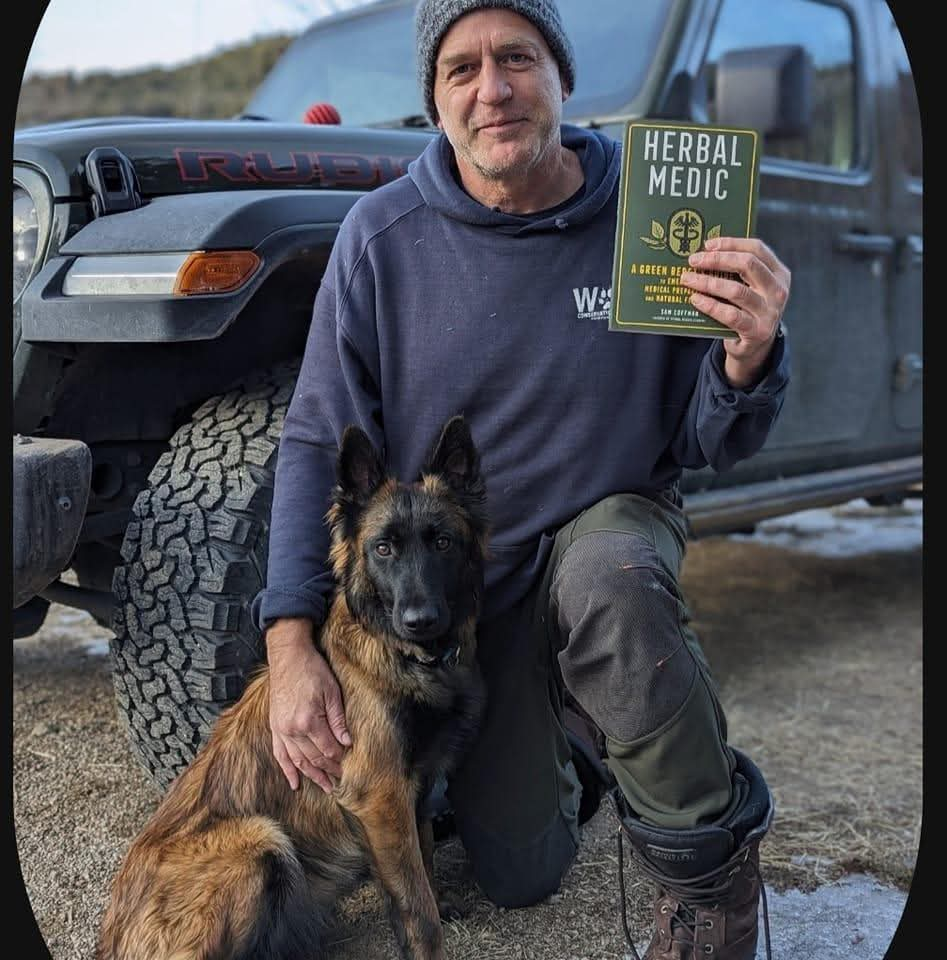
So, how long have you been practicing acupuncture for, and what are your specialties?
Technically, I got my license in 2022, but I have been working as a western clinical herbalist for over 17 years and working with & teaching herbs for over 30 years.
What inspired you to become an acupuncturist?
I have always felt a pull toward Chinese health, Taoism, medicine and martial arts. I was reading voraciously about Taoism and practicing Qigong at the age of 13, and when I decided to go (back) into the military in 1989, it was even back then already a tough decision between doing that to become a US Special Forces medic, or going to TCM school and becoming an acupuncturist. So it was really more a matter of when it finally became the right time in my life to finally be able to do so.
On your journey to become an acupuncturist, what obstacles did you face and how did you overcome them?
COVID hit the USA just into my second trimester of acupuncture school, so figuring out how to navigate through that was difficult of course for everyone. I think between that and co-directing my school (Herbal Medics Academy) while going to acupuncture school, the biggest issues really came down to effective time management.
You’ve spent 10 years in the United States Army as a Special Forces (18D) Green Beret – that’s amazing, and thank you for your service! What are one or two pivotal lessons you’ve learned from your time in the Special Forces that can be applied to patient care in a practice setting?
Actually 10 years total in the US Army, but only 6 of it as an 18D. My first 4 years in the Army I was an interrogator and linguist (German), working on what was at that time the East/West Germany border.
From my time as a military linguist and what is termed HUMINT (Human Intelligence) gathering), I actually learned very valuable listening skills. Reading the body and listening carefully to clients was something that was drilled into me at the age of 18 in interrogator school, and translated beautifully into becoming a better clinician later in life.
As an 18D, I learned to practice medicine in some of the most austere and distracting environments imaginable, and it gave me the ability to prioritize and focus on one thing at a time as I work with patients now.
Tell us about your institution, Herbal Medics Academy. What was the inspiration behind creating an integrative, off-grid healthcare training system for students, acupuncturists, and other healthcare providers?
I had the dream of creating this kind of school since the late 80’s. The first iteration of the school in 1992 was focused more on wilderness survival skills, functional fitness, self-defense and herbal medicine. This became more streamlined over the years, and the version 2.0 that I opened in the Hill Country of Texas still had many of those same components, but focused more and more on teaching all aspects of medicine. This includes food & water sustainability skills, particularly in post-disaster environments.
I learned a lot by going through the US Special Forces Medic Qualification course about how to create scenario-based training environments, and it has always greatly influenced our pedagogy and curriculum. Even though almost 90% of our classes are online these days, we still have highly interactive and even table-top scenario based type online group tests for classes like our Wilderness First Aid (WFA) and Advanced Wilderness First Aid (AWFA) certifications (AWFR is always on-site).
Our outreach organization (Herbal Medics) has worked in Nicaragua, Mexico and in some of the most underserved environments throughout the United States since 2010. Even in our clinical, advanced medicine making and family herbalism programs, preparing students to be able to work together as a team to solve problems that underserved communities ask us to solve, is the a large driving motivation behind all of our courses.
The work of Herbal Medics has included of course free herbal clinics, but also creating slow-sand water filtration in locations nearly 100 miles from the nearest roads in eastern Nicaragua, teaching permaculture gardening techniques (and creating medicinal herb gardens) for community in Navajo Nation, post-disaster herbal clinics in the middle of flood zones in Houston and so many other examples of the application of both this knowledge and attitude.
So the school has always had a driving purpose behind it – To teach students to be the best possible herbal medics in even the worst possible circumstances, and in a way is a sort of botanical-medicine version of many of the principles I first learned in the Special Forces Qualification Course (SFQC) as an aspiring Green Beret medic, but turned toward purely humanitarian outreach.
So even if a student wants to one day open a clinic in the middle of the suburbs, or create an online boutique herb shop (and we have many of these types of students) they also gain an enormous amount experience not only on the core subjects of botanical medicine that they need, but also the big picture of herbalism and the necessity and types of basic infrastructure behind medical self-sustainability.
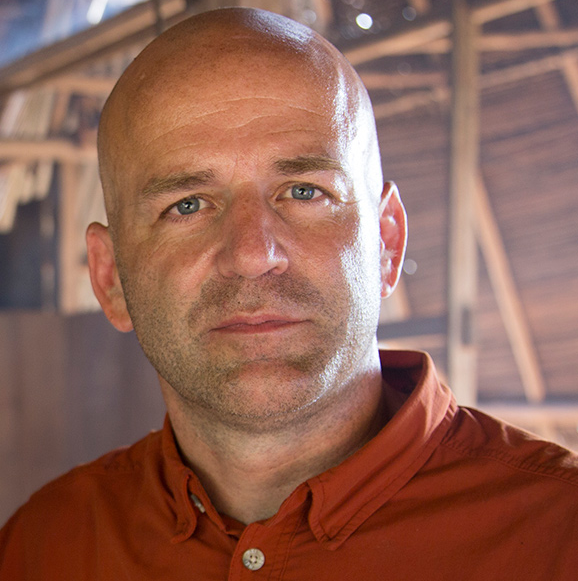
Share a recent success story you had with a patient. What interventions did you use to help them achieve results?
There are many, but a big one not too long ago was a patient who has primary open angle glaucoma, inherited, and was told by her opthamologist to prepare for eventual blindness within a few years. She has her optic nerves tested every six months, and in spite of efforts to slow the progress, it had been moving from moderate to severe. She was willing to try new approaches with me so we worked with my neuro-regen formulas (using several TCM and western herbs that repair myelin sheath damage) applied them as diluted, strongly herbal-infused glycerites and honeys directly into the eye as drops daily.
Within 6 months, her severity rating based on optic nerve damage had already decreased significantly. The opthamologist was amazed at how she has been able to restore optic nerve function (after another year and 2 more tests), and wants her to keep doing what she’s doing. He feels that she may retain her vision indefinitely at this point.
You have a world of experience in herbs. Which work or educational experience do you feel impacted your herbal practice the most to get you to the point you are today?
The SFQC for sure. The writings of Michael Moore, Peter Holmes, David Hoffmann and others. Of course getting my MSAOM, studying for the boards and integrating TCM concepts and herbs with Western Herbalism to begin to create a multi-layered approach to especially chronic disease that has layers of issues from endocrine to autoimmune, and psychological (to use western medical language).
My first 4 years in the Army where I really learned to observe and listen to people. My linguistics undergrad degree has helped me realize how intricate and developed the language of the plants & human health is in the observational semantics of Classical and Traditional Chinese Medicine as compared to the molecular, analytical world of pharmaceutical medicine.
We love that you have a best-selling book! Herbal Medic – A Guide to Off-Grid Herbal Medicine. In addition to that, you also have a recent book release titled Survival Gardening. What contributed to your desire to write books on these topics? For practitioners who want to become a published author, what advice would you give to them about the book-writing process?
I wrote the first book with the original intent of it being the textbook for our herbal medics program when we were starting out in 2007. However, it grew into what it is today through Storey Publishing. It’s amazing what some good editing can do to improve any writer’s work – as a segue to the next part of the question.
There’s nothing wrong with self-publishing (but find a good editor first), and I wouldn’t do it any other way than that for fiction. For non-fiction, it helps in many ways to have an established publisher or one who is at least going to work on selling your book.
Storey has been very nice to work with, and it was at their asking that I wrote the Survival Gardening book with a 3rd book on the way about this time next year on a non-herbalism subject as well. After this though, it’s only going to be plant-medicine writing for all of my non-fiction.
I would also say if you are going to work with a publisher, check them out extensively and also always have a good attorney to go over the contracts with: An attorney specifically experienced in publishing-related law. That helped me as well in the very beginning.
What makes you feel inspired about acupuncture?
Scalp and neuro-acupuncture is pretty amazing and I’d like to go that direction clinically at some point. The home of that is right here in New Mexico in fact.
Working with needles also has an amazing potential as medicine that can be taken into the field so easily.
However – The saying goes that in the USA, acupuncture is 80% needles and 20% herbs while in China it is 20% needles and 80% herbs.
I’m simply much more of an 80% herbs kind of guy.
Looking back, what advice would you have given to the younger version of yourself, who was just getting started in this profession?
Hmm… “Watch out where the huskies go, and don’t you eat that yellow snow?”
🙂
Everything I experienced was vital to experience in the way and mindset I experienced it, in order to be who I am here and now. Advice from my future self would only hinder that process.
What keeps an acupuncture practice going?
An attitude of service.
What are specific roadblocks to watch out for as a new acupuncturist?
Income in relation to needs.
What are your favorite acupuncture points, and why?
Maybe more memorable than “favorite” but KD 3 was the first point I really was able to feel and experience the movement of Qi and the effect it had on the patient.
Tell us about some herbal formulas and foods you find yourself consistently recommending to your patients, friends, and colleagues. What makes these herbs/foods so helpful?
From a western perspective, formulas that move lymph and tonify the immune system, herbs that soothe, protect and tonify the mucosa and herbs that tonify and decongest the liver, are 3 major areas with “low hanging fruit” results for so many acute conditions.
From a TCM perspective, there is an epidemic of deficiency conditions in the vast majority of my patients. Approaching from that direction has added a completely new healing level and integrative paradigm for me. It has been life and practice-changing to be able to start combining these worlds.
Sometimes, the best resource for improving our skills is by learning from the other acupuncturists we meet along our professional journey. What is one thing you learned from a fellow acupuncturist or holistic practitioner that has helped you in your professional growth, or in your care for patients?
I had many great instructors at Texas Health and Science University in San Antonio and I learned such a vast amount from working with them in clinic above all.
What are some daily habits or rituals you practice that keep you feeling your best?
Walking/running my Search and Rescue dog Lucy (we work in Taos Search and Rescue), every morning up the trails into the national forest that our property borders.
Drinking our home made chai. Some type of functional fitness or mobility movement
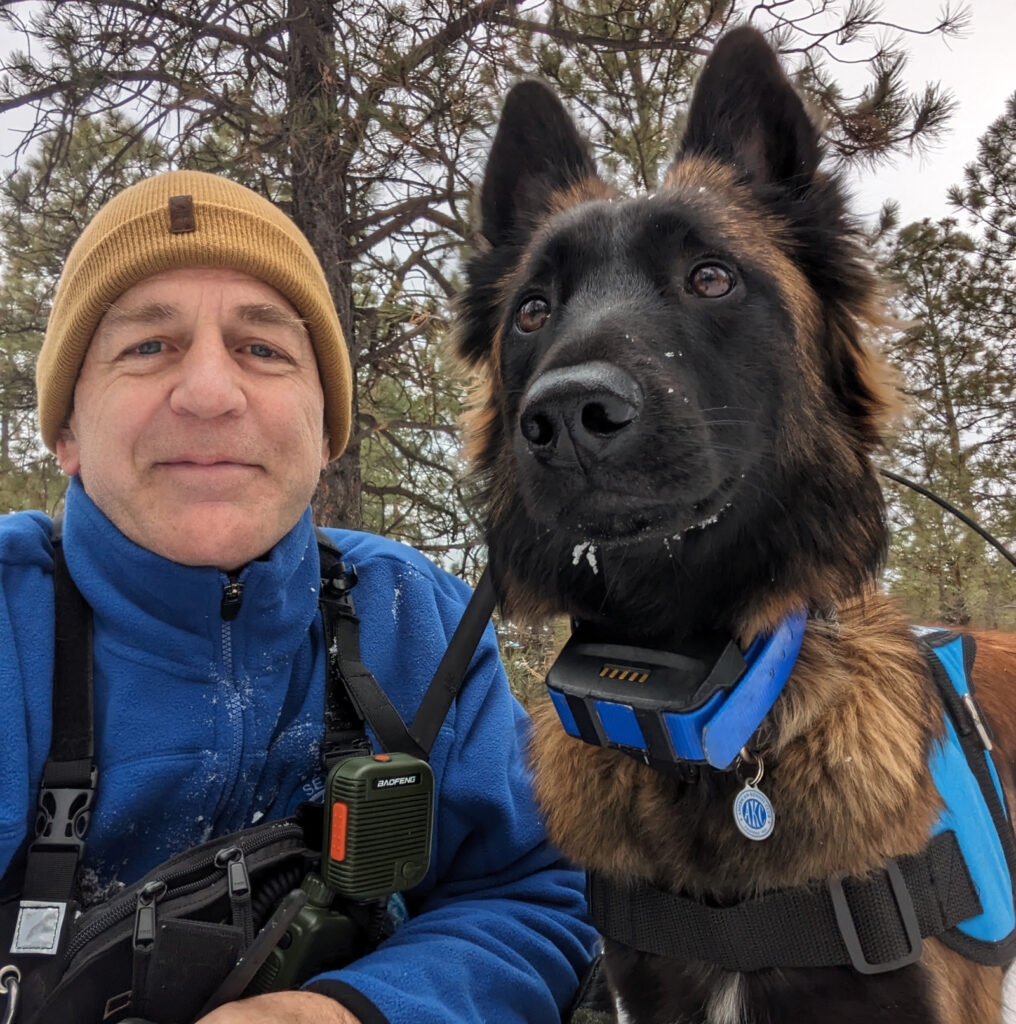
The kindest thing a patient or student said to you recently:
We get at least an email once a month from students who tell us how we have changed their lives. It is so wonderful to hear their stories.
The funniest thing a patient or student said to you recently:
I honestly can’t remember. I get reminded of the apparently funny things I say all the time though.Recently a student was laughing while telling another student in front of me that during a field scenario in a WFR course, I said something to the effect of “if you guys move any slower, your patient is going to die of old age.”
As an acupuncturist and herbalist, what are you most proud of thus far in your professional journey?
Founding and running my school for the past 18 years, and literally creating a niche that we are the only ones who occupy: The integration of western herbalism, TCM and allopathic care in remote, austere and post-disaster environments.
What is your definition of success?
Contributing something, anything to leave the human and planetary condition a little bit better somehow.
If you could have a billboard with anything on it, what would it say?
“A mind is like a parachute. It doesn’t work if it’s not open.”
– Frank Zappa – since I quoted him earlier too.
If you could have one superpower, what would it be and why?
To speak and understand all languages, human and animal, on this planet.
If you were to choose a spirit animal for yourself, what would it be and why?
A wolf. I feel the calling to roam, but also to help the pack.
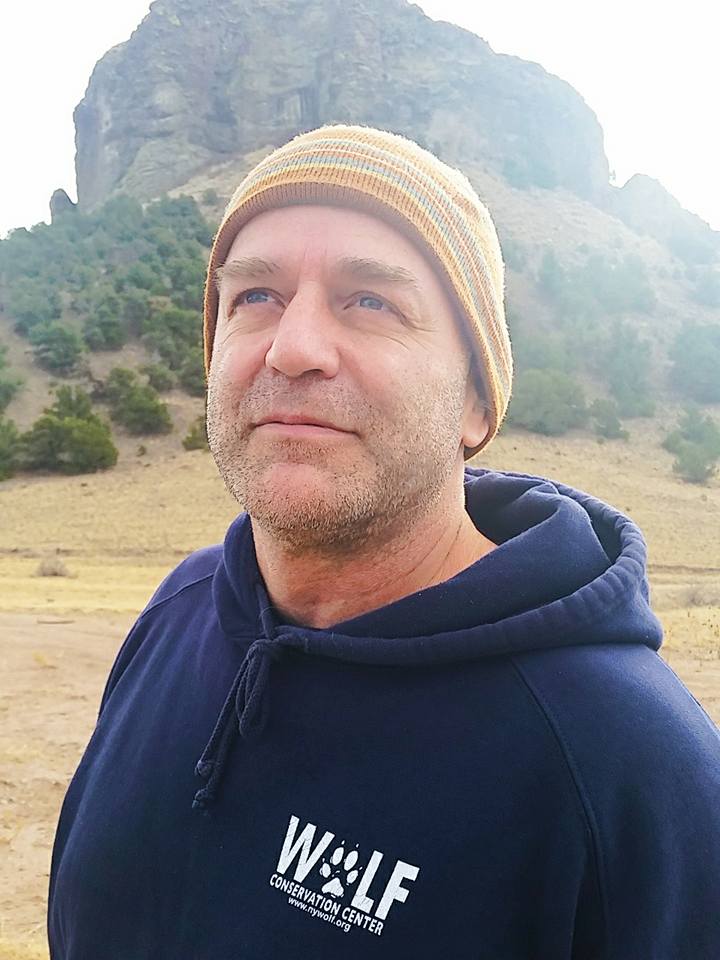
Rapid fire questions!
Morning or night?
Morning
Tea or coffee?
Tea (actually Chai – as we make our own and I can’t live without it)
Sun or moon?
Sun
Cupping or Tui na?
Tui Na
Yin or Yang?
Yin
Meditation or exercise?
Exercise
Instagram or Facebook?
FB
Top 3 Favorite Books?
Energetics of Western Herbs by Peter Holmes – I’ve used these 2 volumes for over 30 years now, and it’s the only herb reference book that I can say that about.
The Bensky Materia Medica – for the past 5 years or so, because it is the gold standard of how a Materia Medica should be written, imo.
I’m also a big post-apocalyptic fiction fan and there are quite a few books or series that would be my favorites in the fiction world.
On that note, I’m also almost finished with my own first book of an eventual post-apocalyptic fiction series that – as a side note – pulls in aspects of both TCM and herbal medicine around the main characters.
Where can other practitioners, acupuncture students, and patients go to learn more about you and your work?
School – https://herbalmedics.academy
Store – https://herbalfirstaidgear.com
Outreach organization: https://herbalmedics.org
IG – @herbalmedicsam
Blog – https://blog.herbalmedics.academy/
Books
– Herbal Medic: https://www.amazon.com/Herbal-Medic-Emergency-Medical-Preparedness/dp/1635861934/
– Survival Gardening: https://www.amazon.com/Survival-Gardening-Emergency-Supply-Cellar/dp/1635866464/
